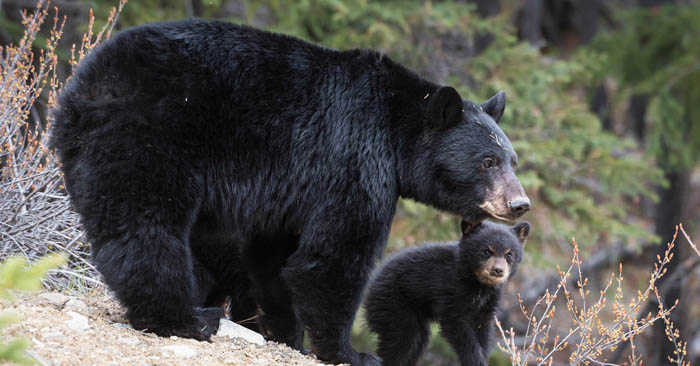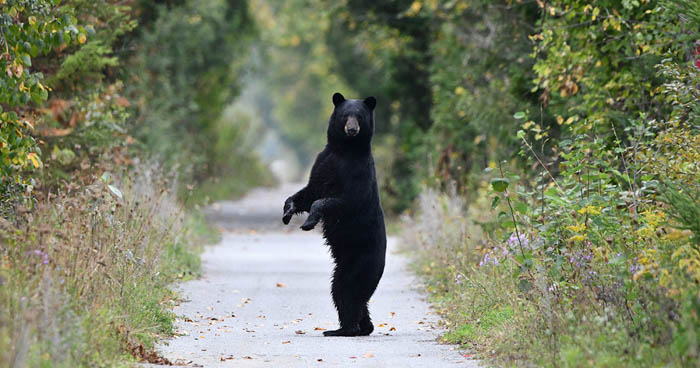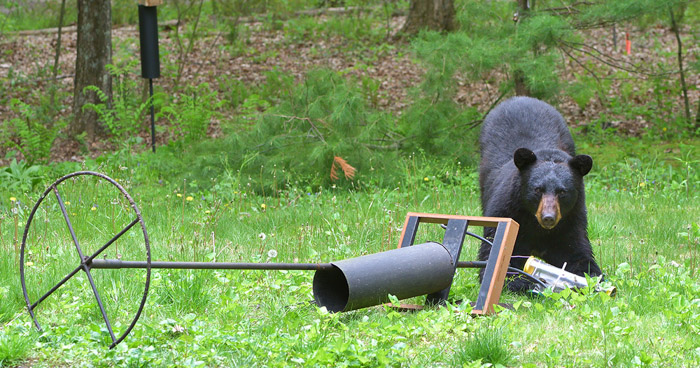BearSmart
Learn more about Bear-Resistant Garbage Bins
Black bears are a common sight in Wood Buffalo, so it is important to stay prepared and be aware of important BearSmart practices. Alberta’s BearSmart program is a public awareness program that educates Albertans on bear behaviour and how to prevent and respond appropriately to bear encounters.
If you see a bear on a neighbourhood street, in a park or anywhere in the Urban Service Area and it is not an emergency, report the sighting to Alberta Fish and Wildlife at 780-743-7200. If the non-emergency sighting is after business hours, please call the Report A Poacher hotline at 1-800-642-3800.
In an emergency situation, residents should always call 9-1-1 for assistance.

Wood Buffalo’s bear population
Bears are a fact of life in the boreal forest. Alberta is home to an estimated 40,000 black bears and 700 grizzly bears. Black bears are widespread throughout the province and are a natural part of Wood Buffalo’s forest ecosystem. Grizzly bears are not normally found in Wood Buffalo.
Bears are very food-motivated and are most likely to enter human-inhabited areas when looking for food. As Alberta’s BearSmart Guide says:
In the spring, summer and fall bears need to eat enough to survive winter, when they spend between four and six months in their dens. Bears can consume up to 25,000 calories a day. Most of their diet is actually low in calories—the natural diet of a bear is 85 to 90 per cent plants and berries and 10 to 15 per cent insects and mammals. This means they must eat a lot, and often.
Stay BearSmart in and around the woods
Remember to watch for bears when going into their territory (any forested area). Whether you’re hiking, biking, fishing or just walking along the treeline, always be BearSmart:
- Don't wear headphones or anything that might compromise your hearing.
- Bring bear spray with you and keep it in an easily accessible place, such as at your belt instead of inside a backpack.
Alberta Bearsmart Guide
| Here are some times and places where bear encounters are more likely, according to Alberta’s BearSmart Guide: |
|---|
|

Bear encounters - What to do
All bears are individuals, so each bear encounter will be unique. Serious attacks are rare, but you must always be BearSmart when in forested areas. All bears have a “personal space” and feel threatened when this space is invaded. How they react to the threat is not always predictable and will depend on the situation at hand and the character of the individual bear.
Alberta Bearsmart Guide
| When you see a bear the most important things to remember are: |
|---|
|
Read the Alberta BearSmart Guide for more best practices on how to handle bear encounters and bear behaviour.
If you see a bear on a neighbourhood street, in a park or anywhere in your community and it is not an emergency, report the sighting to Alberta Fish and Wildlife at 780-743-7200. If the non-emergency sighting is after business hours, please call the Report A Poacher hotline at 1-800-642-3800.
In an emergency situation, residents should always call 9-1-1 for assistance.

BearSmart at Home
Bears venture into human habitat most often when they detect easy food sources left out by humans. If you live near a forested area or treeline, minimize the risk of bear encounters by managing food sources:
- Put out garbage the morning of collection day.
- Store garbage cans indoors, or clean them regularly.
- Clean your barbecue after every use.
- Collect fruit from trees and gardens quickly, or pick fruit before it ripens.
- Keep meat, fish and oils out of your compost heap.
- Do not put out birdfeeders from April to October.
Without tempting snacks and smells, bears have less reason to wander into your backyard. They will not become habituated to an area if they do not find a food reward.
Contact Us
PULSE
Submit a request
Phone: 780-743-7000
Toll free: 1-800-973-9663
Subscribe for RMWB updates
Stay up to date on the services, programs and projects in your neighbourhood!
